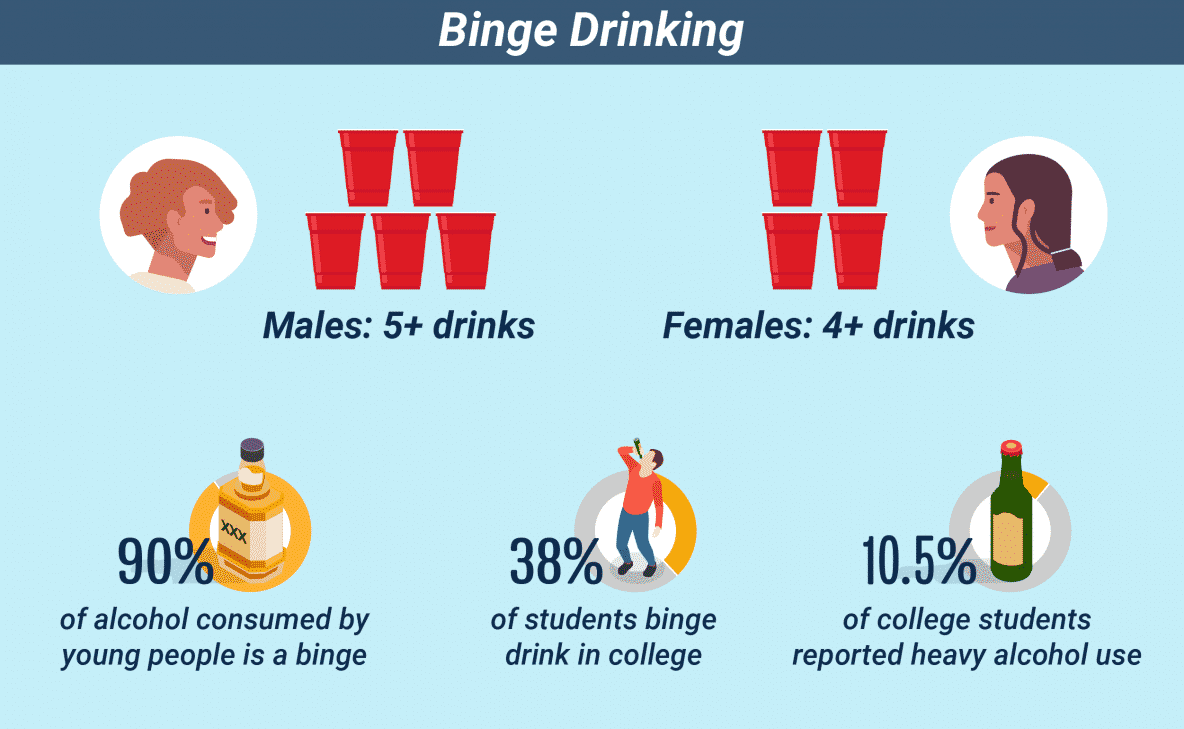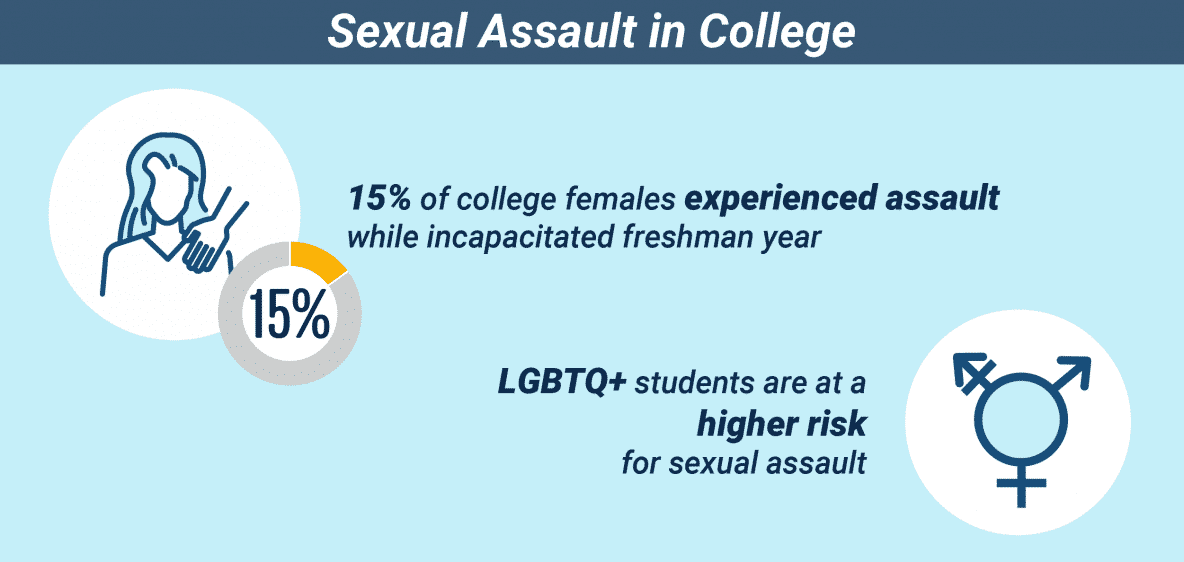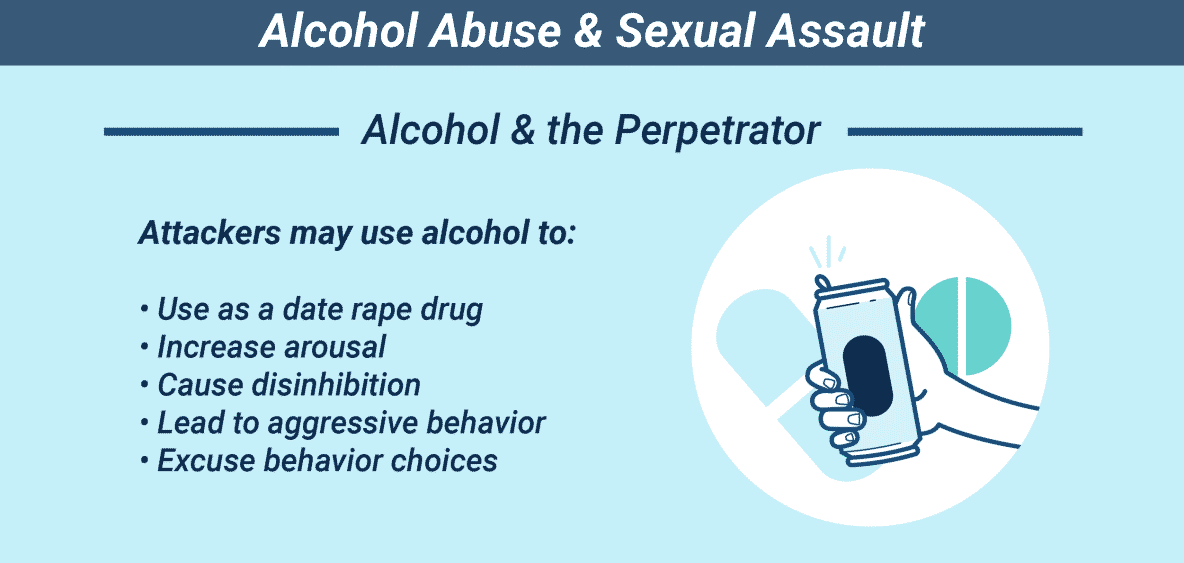The link between drinking and sexual assault puts college students at risk of being attacked.
College sexual assault statisticsshow that alcohol is involved in aroundhalfof the cases ofsexual assault oncollege campuses. Overall, more than97,000collegesexual assault caseslinked to drinking happen each year. These casesincludesituations where:
- The attacker is drinking
- Thesexual assault victimsare drinking
- Both attackers and victims are drinking
About90%of the time, the attacker knows the victim. Attackers and victimsoftenare not close but know one another casually. Although alcoholdoes not causesexual assault, drinking is a risk factor that can make it more likely to occur.
Binge Drinking Culture on College Campuses
Because most underage drinkingis done to get drunk, teens are at risk of binge drinking. In fact, close to90%of the alcohol consumed by young people is during a binge.College binge drinking statisticsshow that close to61%of underage drinkers admitted to binge drinking in the past month. Binge drinking isdefinedas:
- For males, five or more drinks on the same occasion at least one day in the previous month
- For females, four or more drinks on the same occasion on at least one day in the previous month
- Heavy alcohol usemeansthat someone binge drank on five or more days in the previous month

College Students and Alcohol Abuse
College drinking cultureis linked to risk ofteen drinkingandalcohol abuse in college. By the age of 18,60%of young people have had a drink. However, the problem is not limited to casual drinking in young people.College alcohol abuse statisticsshow that as of 2016:
- Close to38%of students admitted tobinge drinking in collegethe prior month
- Roughly10.5%of college students admitted to heavy alcohol use during the previous month
Sexual Assault in College
One of theriskiest timesforteens and sexual assaultis during the first few months of the first and second semesters at college.Teen alcohol abusecan increase this risk.College freshman drinking statisticsshow that15%of college females were assaulted while incapacitated during their first year at school. However, the risk of sexual assault goes beyond freshman year. Studies project thatnearly 5%of college women may be raped annually and that up to 25% of college women may be sexually assaulted during their college career. Sexual assault includes many different kinds of attackslike:
- Forced touching
- Forced kissing
- Coerced sex
- Rape including oral, anal and vaginal sex
Although all women are at risk of sexual assault, those who are gay, lesbian or bisexual are at ahigher riskthan heterosexual women.

Link Between Alcohol Abuse and Sexual Assault
Alcohol and sexual assaultare closely linked. When reports about college rape cases get publicity, they often involve drinking.
- In 2006, theDuke lacrosse sexual assaultallegations hit the news. Although the players were eventuallyexonerated, they were charged with raping a stripper during an alcohol-fueled party. The district attorney in charge of the case was disbarred and sent to jail for holding back evidence that helped show the players were innocent of the charges.
- In 2008, University of the Pacific basketball player Beckett Brennan accused three male student basketball players of rape after drinking at a party. Although no criminal charges were filed, two of the males were suspended from the school and one was expelled.
- In 2013, five Vanderbilt football players were accused of rape of a drunk woman who had lost consciousness. Four of the five were convicted and are serving time in prison, while the fifth agreed to a plea deal.
- In 2015, theBrock Turner sexual assaultcase hit national headlines. The former Stanford swimmer was charged with sexually assaulting a woman who was drunk and unconscious. The charges led to a conviction and jail time.
Alcoholwas involved in all of these high profile cases. Sometimes the attacker was drinking, sometimes the victim was drinking, and sometimes both were drinking.
Alcohol and the Perpetrator
Doctors think thatalcohol and sexual aggressionare linked. In fact, drinking may increase the risk ofsexual aggressionin attackers. Research shows that heavy drinkers aremore likelyto have personality traits linked to sexual assault, likeantisocial behavior.Perpetrators of sexual assault most oftenseek outsettings where drinking takes place, like bars and parties to identify potential victims. Attackers may usealcohol as adate rape drugorto:
- Increase arousal
- Cause disinhibition
- Lead to aggressive behavior
- Be used as an excuse for behavior choices

Alcohol and the Victim
Among college sexual assault victims, those who drink alcohol are athigher riskof attack. One reason for this is that women who drink may beless able to defend themselveswhile drunk andless awareof what is happening around them. In fact, abouthalfof victims had been drinking before being attacked. Sadly, drinking often causes victims to be ashamed of what the attacker did to them. Victims who drinkoften:
- Feel distressed
- Blame themselves
- Are scared others will blame them
- Worry they will not be believed
In addition,alcohol and date rape drugsmay be combined. In turn, the mixture may make sexual assault even more likely, because therisk of blackoutis increased. While sometimes the victim takes the drug on their own, in other cases, the drugs are slipped into the victim’s drink. Drugs linked to sexual assaultinclude:
- Cannabis
- Cocaine
- Gamma hydroxybutyrate (GHB)
- Benzodiazepines like Rohypnol, the brand name for flunitrazepam
- Ketamine
- Barbiturates
- Chloral hydrate
- Methaqualone
- Opioids
- Hallucinogens
Unfortunately, after an attack, some victims may turn to substance use to cope with the trauma. Some common substancesincludealcohol and drugs. Sexual assault victims may then fall victim again, this time to asubstance use disorder. Theeffects of alcohol abuseorteen drug abuseon victims can then compound the problems they face. Further, because drinking is a risk factor for sexual assault, the victim might be at risk of additional assault as well.

Where to Get Help
If you are in a dangerous situation and need help, call 911. If you are out of immediate danger and would like to report a sexual assault or some other crime, you can contact your local police to file the report. However, only about20%of sexual assault victims report their attacks to the police.
Because thepercentage of college sexual assaults that involve alcoholis almost50%,alcohol and sexual assault on college campusesis a big issue for schools.Title IX sexual assaultguidelines require that colleges haveresources for sexual assault victims. Campus or off-site counselors can also help victims after an attack. In addition, if the attacker was a student, your schoolis required to take steps certain stepsand they may be able to help you feel more safe on campus by helping you change dorms or class schedules, or even obtaining a no-contact order.
If you or a loved one are struggling with alcohol abuse, help is available. Our compassionate professionals are experts not only inalcohol abuse treatmentfor adults, but also in teen drug rehab andteen alcohol rehabas well.Contactus today to learn more about available treatment options.
















